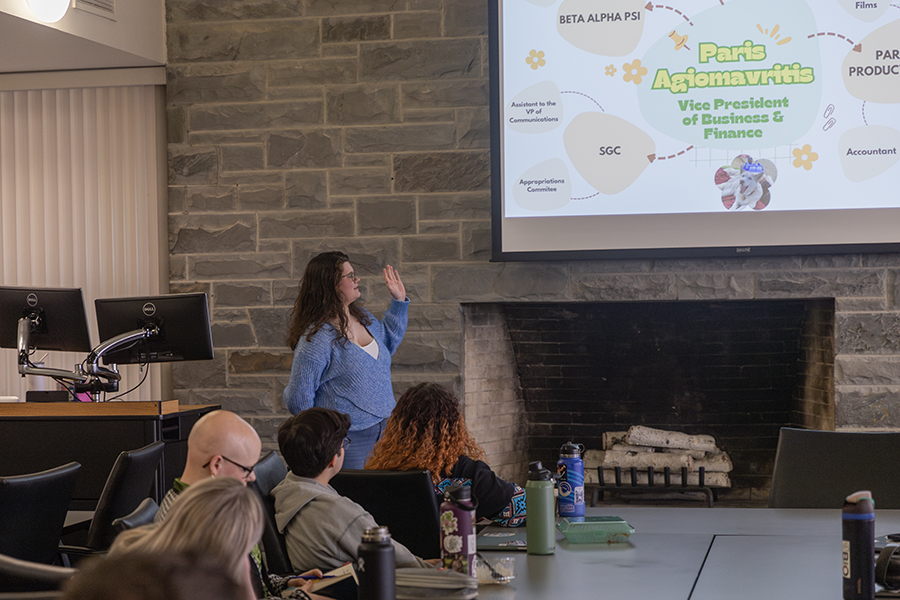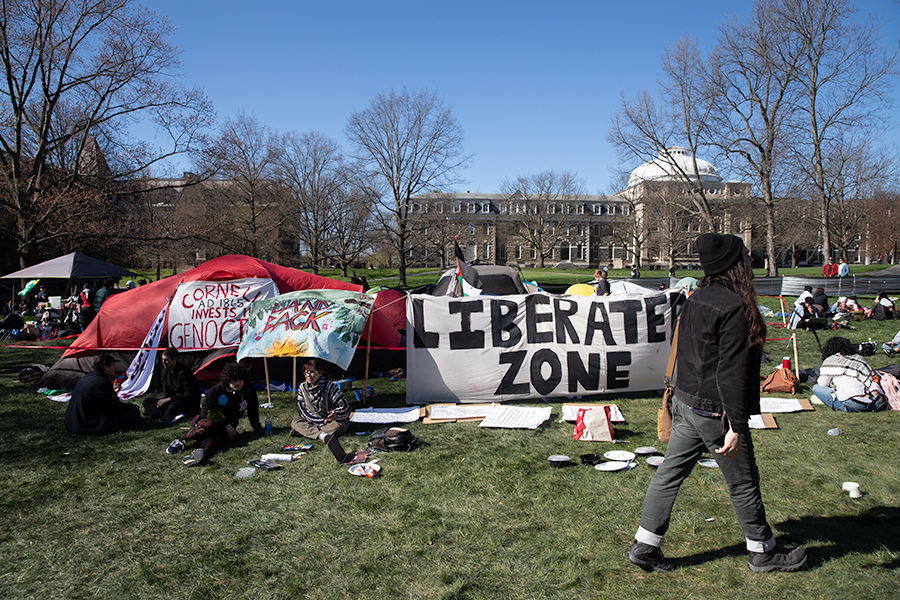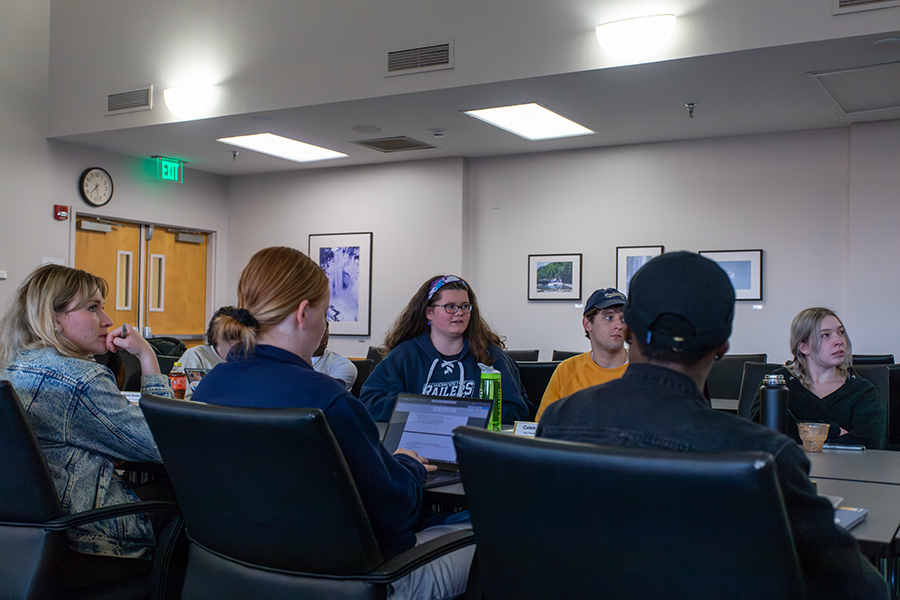
With the Occupy protests and countless displays of student activism taking place around the world, including Ithaca College, this generation of young people has been associated with activism and civic-mindedness. But new research offers a radically different perspective.
A study in the “Journal of Personality and Social Psychology” found millennials, people born after 1982, are more individualistic and self-centered than Generation X’ers, who are people born between 1962 and 1981, and baby boomers, people born between 1946 and 1961.
The study, which was conducted by Jean Twenge, a professor at San Diego State
University; Elise C. Freeman, a graduate research associate at the same university; and W. Keith Campbell, a professor at the University of Georgia, compares the life goals of American high school seniors and college freshman spanning different generations.
The study was based on two public data sets, the University of Michigan’s “Monitoring the Future,” and the Higher Education Research Institute’s “American Freshman Survey.” Both national surveys have been conducted for more than 30 years.
“Monitoring the Future,” annually surveys approximately 16,000 high school seniors in about 133 randomly selected schools. “The American Freshman Survey” surveys the
incoming classes of several hundred randomly selected colleges.
Since 1980, when Generation X’ers were college-age, there has been a decline in goals relating to self-acceptance, affiliation and community, and a rise in goals related to money, image and fame. The study also shows a decline in concern for others and civic orientation.
Campbell said this research sheds a negative light on the generation of young people.

“There’s less cohesion socially,” Campbell said. “You find less civic engagement, less environmental concern, less empathy for other people and higher narcissism.”
According to the study, this same shift can be seen when baby boomers are compared to Generation X’ers. When asked to rank their life goals, students have consistently ranked being “well-off financially” as most important since 1989.
Campbell said this trend could have been occurring for centuries, but has only become apparent recently.
“There’s been a broad societal change in individualism that goes way back to the 1500s,” he said. “You really see this change starting [around] 1970 with some of the baby boomers coming of age.”
Fred Wilcox, professor of writing at the college, was in college during the ’60s and said students
today are more focused on their own career options.
“Colleges and universities have essentially become a training ground for corporate America, and it hasn’t always been that way,” he said. “I don’t know why, but when we were in college, we just didn’t worry about getting jobs.”
Not everyone agrees with the research’s results, however. According to a 2008 study conducted by the Center for Information and Research of Civic Learning and Education, the millennial generation has been one of the most civically engaged generations of college students.
Lee Ann Vaughn, a professor of social psychology at the college, said the conflicting information in these studies sheds light on the existing sentiments about the generation’s role in civic engagement.
“While there is this interesting information about scores on narcissism going up, there’s also very strong evidence that this generation is also highly civically engaged,” she said.
Contrary to Twenge’s results, some students also believe this generation is just as caring as older age groups. Senior Brennan McKenna said while there are certainly self-centered individuals in this generation of youth, he said he also consistently sees many people volunteering for philanthropic causes.
“I see a lot of people reaching out and helping others,” McKenna said. “I see just regular people lending a helping hand, especially when people are struggling.”
Though individualism generally carries a negative connotation, Campbell said, it also has its benefits. He said individualism causes people to focus on who others are as people rather than who they are associated with.
“There are some positive sides to individualism, a big one is women’s rights and lower levels of prejudice against people because of group membership,” Campbell said. “We tend to judge people as individuals rather than groups.”
However, this decline in prejudice has accompanied a decline in empathy and understanding of others. In a commentary in “The Chronicle of Higher Education,” Twenge said this lack of empathy could be seen in the recent webcam case at Rutgers University. According to Twenge, Dharun Ravi, who filmed his gay roommate performing sexual acts, did not understand his actions could hurt someone more because that person belongs to a minority group.
The trend of increased individualism is expected to continue on into future generations, Campbell said, but the extent to which it will may vary. He said a downturn in the economy may bring people together, similar to the way the Great Depression yielded the generation often referred to as the “Greatest Generation.”
Young people have already come together in response to the recession, as seen in the Occupy protests. Earlier this week, Occupy protestors held a rally outside of Sallie Mae, a student loan organization, in response to the student debt crisis.
According to the study, there isn’t one clear reason for why these changes have occurred. Campbell said this trend was caused by a spectrum of societal changes.
“When we started focusing on these trends in individualism, you see changes in economics, the media, education and even parenting that go along those lines,” he said.
Some students at the college said they have in fact noticed a shift toward self-centeredness in this generation of youth. Many blame the coddling nature of modern education and parenting. Sophomore Adrian Anderson said an overabundance of positive validation may have caused this shift.
“Everyone gets a trophy nowadays, and you’re not necessarily rewarded on your performance,” she said.
Other students believe social media may be responsible for the trend. In recent years, online activism has become increasingly popular. Instead of physically becoming involved, many young people choose to sign online petitions and share videos. Sophomore Michael Johnson said social media has caused people to become closed-off and focused on their own lives.
“A lot of young people today seem very jaded,” he said. “Maybe that’s just the era we’re in in our lives. The mass-media culture has changed the way we interact with human beings.”
With data supporting two opposing viewpoints, it’s hard to make solid inferences about the millennial generation. Vaughn said both sides of the argument have valid points.
“As is usually the case when talking about sociological and psychological data, who knows what exactly the big picture is here,” she said. “It could very well be the case that both trends are real, and it’s not entirely clear what sense to make of that.”







